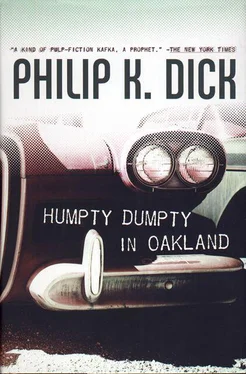“All right,” Julie said in a brisk, practical voice. “Suppose they do just feel sorry for you. What does that matter?” Her voice rose. “It’s still a good job; it still pays well. What do you care about their motives? That’s paranoiac!” She gestured excitedly with her fork. “What’s the name of the place? I’ll go down and talk to them; I’ll phone—that’s what I’ll do. And say I’m your secretary and you’ve decided after long consideration to accept the position.”
The whole world’s mad, Al thought. It’s all sham.
“If you have the gumption to go out and rustle up a high-paying job opportunity,” Julie said, “you have the gumption to take the job and do good at it. They wouldn’t offer it to you if they didn’t have faith that you could do it. Take it, or Al—I’m not exaggerating—if you turn it down, I know myself and I know I’ll react by considering that you won’t have been loyal to me. We took marriage vows. You’re supposed to honor and obey me.”
“It’s hard to obey in this case,” he said.
“Not obey, here,” she said. “But honor and respect. By taking a decent job so that we can have children, and do all the other things we want to do and deserve to do.” Her voice had become harsh with anxiety; he recognized the tone. “Don’t let me down again, Al; please don’t give way to your neurotic anxieties. Promise me.”
“We’ll see,” he said. It seemed to him that he had suffered some crushing defeat by being offered a straightforward, worthy job at a good salary, and now this reaction, this sense of things having gone wrong, began to worry him. On the surface, his reactions did seem odd, to say the least. Maybe Julie was right; maybe now that at last someone had decided to have confidence in him, to take a chance on him, his own inner sense of worthlessness had begun to emerge. He was as neurotic as Julie said; it was true.
Defeat or success; it’s all the same to me, he decided. It’s all a grind. A snare and a delusion. Who wants it? Either one.
“You’re afraid,” Julie said, “to stick your neck out. If you fail, then you’ll sink even deeper into apathy; you’re conscious of that. You have that much insight. You’d prefer to stay as you are, because the risk of failure is so great; it has such dreadful consequences to you. Isn’t that so?”
“I guess so,” he said.
“So you’ll just go on like you are forever. Drifting. Getting nowhere. Al—” She faced him with a stony expression. “I really don’t know if I can go on. I just don’t know. I want to, but I can’t; I really think I can’t. If you let me down again, here.”
He grunted a meaningless response.
After dinner he dropped over to Tootie Dolittle’s apartment. Both Tootie and his wife were home; they were cleaning the burners of the kitchen stove. Newspapers had been spread out everywhere. The sink was filled with soapy, gray-gritty water.
Seating himself out of the way, Al discussed his job prospect with Tootie, who listened carefully to all the details.
“Maybe it’s a front,” Tootie said, when Al had finished.
That idea had not occurred to him, and it cheered him up; it put an entirely new interpretation on the situation, on the job offer and on Harman. “Maybe so,” Al said. “You mean they still don’t want to give me the real dope. They’re still holding up a smokescreen.”
“Sure, they’re going to break it to you after you’ve worked there awhile. After they know you real well. That’s natural.” He went on to recount to Al the details of a job he had had driving a woman around who ran an abortion mill. It had been months before he had out that it was not a Swedish massage place; they had kept it from him as long as possible.
He then took Al off into the other room, so that the two of them could talk in private.
“There’s one thing you may be missing,” Tootie said. “I happen to know about Teach Records, because of my interest in music. They got a good catalog, but you know why they call themselves that name. They are a pirate label.”
“What’s that?” Al said.
“They stole their master discs. I mean they pirated the original records and dubbed from them. They got no legal right to the masters they press from, but they always pick something where the company is out of business and the artist dead and so on. Or some foreign label. Anyhow, Teach was a pirate. That was Blackbeard; his name was Edward Teach.”
“I see,” Al said, pleased. “I didn’t make the connection.”
“So there’s no doubt they’re up to that,” Tootie said. “So maybe this one fact enough to make you more cheerful. You obviously feel only somebody doing something crooked is going to pay you almost eight hundred dollars a month. If they honest, they’re not going to pay you anything hardly at all. That’s because you know perfecdy well down inside you, and I say this from being a friend of yours and knowing you pretty well, you know you not worth anything.”
“You want your block knocked loose?” Al said.
“I knock your block loose right back,” Tootie said. “Now listen to me. You not worth anything because you got nothing to sell. You like a lot of colored boys who come up North, to cities, from the farmland in the South. You come from a farm town, up in Napa County. You more like those boys than you know. I know, though. I see a lot of the same things in you as in them, but you too ignorant to recognize that; I mean ignorant of what I happen to know, although you plenty smart in other ways. Here all they got to sell when they come to town. Their work . Laboring somewhere, like in the Chrysler plant or driving a truck or putting on tires at Monkey Ward. Why anybody pay them anything? Why you pay them? You hire them to wash your cars on your lot for you, if you had any money; other lots do that—other lots have a colored boy. You so poor you your own colored boy.”
“So what?” Al said.
“So other people not going to go on like that,” Tootsie said. “They want to rise and be well-to-do, so they figure out something they can sell; they find something they can do somebody else want enough to pay for. But you too dumb. You not learn nothing to do. In that respect you different from most people, white and colored. You got to learn to do something other people want. Like my dog Doctor Mudd. He learn to bat balloons with his nose, so everybody pay to watch; he a lot smarter than you. Nobody pay you to do nothing, because you dull. You miss out. You go on being what you are, instead of being what other people pay to watch. Maybe when you get old you realize this, but then it too late. You got to assume a vivid personality. Live like you a dangerous, terrific person, like a spy or something. You got to go around create mystery. Nobody know when you come or go or what you do. Listen. That exactly what Mr. Harman do. He make everybody tell tall tales about him, and they not really know what he do or what he is. But they know what Al Miller; it written all over him.”
Al was silent.
“You not got glamour,” Tootie said. “That it in one word. You nothing but ditch-water walking around on two feet.”
“Maybe so,” Al said.
“Life like Ed Sullivan’s program,” Tootie said. “I watch that every week on the TV. That the best TV show there is, now that Milton Berle retire. I watch these show people come up; they got no talent. That the truth. What they got is personality. Who got talent these days? Al Jolson; he never had no talent. Nat Cole; he can’t sing. Frank Sinatra never could sing. Fats Waller couldn’t sing; he croak like a frog. Johnny Ray terrible singer. Sammy Davis Jr. nothing but a big ham-bone, but he very popular. Kingston Trio; bunch of college kids. But they got personality. You have to learn how to do that.”
Читать дальше










